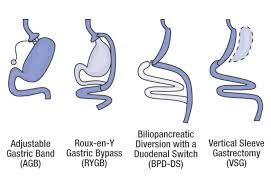Bariatric surgery is a group of surgical procedures which help to decrease the body weight of an individual. It is indicated for people having morbid obesity (BMI> 35 kg/m2 with significant comorbidities or BMI > 40 kg/m2 with or without associated comorbidities). The reduction in body weight is primarily due to loss of body fat which is a result of the negative energy balance achieved after the surgery. This is done by either reducing the capacity of the stomach to limit the intake of food at one time (restrictive procedures) or by decreasing the effective length of intestine available for absorption of food (malabsorptive procedures) or both mechanisms (combined procedures).
Restrictive procedures include
1. Gastric Sleeve in which the majority of stomach is removed using a stapling device to create a long, narrow tube of the stomach
2. Gastric Banding in which an adjustable silicon band is placed around the upper portion of the stomach to limit the intake of food
3. Gastric plication in which the stomach is sutured in 2 layers to reduce its capacity
Malabsorptive procedures include
1. Jejunoileal Bypass in which the first part of the intestine is cut and connected directly to a part which is present distally reducing the effective length of the intestine. This procedure is not performed nowadays
Combined procedures
1. Gastric Bypass – In this, a small pouch of stomach is created which is joined directly to the cut portion of the small intestine. The small pouch restricts the quantity of food taken while the intestine is bypassed to limit absorption.
2. Biliopancreatic diversion- The stomach is divided as in a sleeve gastrectomy and the cut portion is connected to the small intestine for malabsorption
3. Bariatric surgery has been proven to be the only effective procedure for long term weight loss in patients with morbid obesity. Besides this, it helps in reversal or improvement of the majority of associated medical conditions and increases lifespan as well as the quality of life.
A large number of scientific studies as well as meta-analyses have shown an average excess weight loss of more than 60% over a five year period. In absolute terms, this amounts to a weight loss of 35-50 kg depending upon the BMI of the individual and the procedure performed. Long term follow up (> 15 years) has shown that this weight is maintained in the majority of people.
Medical illnesses associated with morbid obesity like diabetes, hypertension, increased cholesterol and heart diseases have been shown to be improved or reversed in up to 60-80% of patients undergoing bariatric surgery. This leads to reduction in the cardiovascular morbidity and mortality. Other conditions like obstructive sleep neap, joint disease, reflux disease and fatty liver have shown significant improvement after surgery in patients suffering from these conditions. The primary mechanism for this is weight loss and other factors such as decreased visceral fat and improvement in insulin resistance also contribute. Besides these, weight loss surgery is associated with improvement in gout, asthma, varicose veins, urinary incontinence and infertility.


Currently, bariatric surgery or weight loss surgery may be an option for adults with severe obesity. Clinically severe obesity is a body mass index (BMI) of at least 40, and for people with BMI 35 with a serious health problem linked to obesity.
ReplyDelete